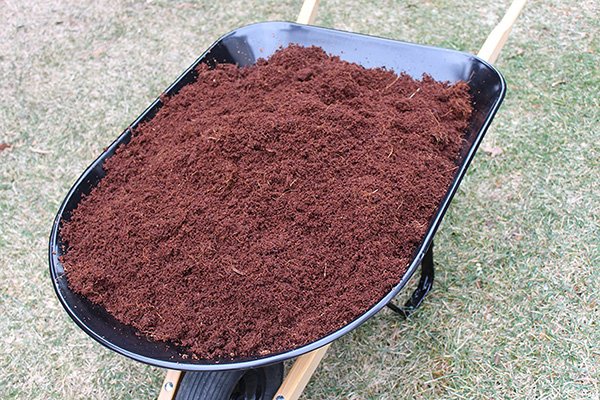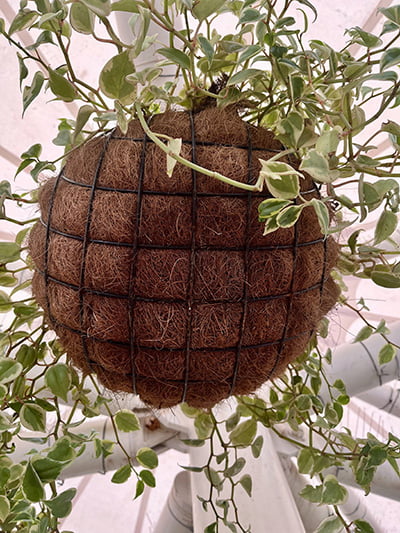Are you ready to take your gardening game to the next level? Say hello to the secret weapon of every green-thumbed enthusiast out there – coco coir! This magical substance is the ultimate solution for anyone looking to boost plant growth without breaking the bank. Made from the fibrous husks of coconuts, coco coir is the perfect soil alternative that not only helps your plants grow faster and stronger but also does wonders for the environment. Plus, coco coir is free from harmful pathogens and chemicals, making it a safe and healthy choice for you and your plants. So, coco coir is the way to go if you want to achieve lush, healthy, and vibrant plants. Let's explore more about this incredible soil alternative and see how it can transform your gardening game!
What Is Coco Coir?
Also known as coconut coir, coco coir is a natural byproduct of coconut fiber derived from coconut husks found between the inner shell and the protective outer coating of a coconut seed. Coconut fiber is extracted from the coconut husks and processed to make coco coir — a growing medium or soil amendment. Quickly becoming a favorite amongst those with a green thumb, coco coir is a sustainable alternative for peat moss. It helps you cultivate a thriving garden in a safe and eco-conscious way. It is an excellent option for various types of gardening, including container gardening, potted plants, raised beds, and hydroponic gardening.
How is Coco Coir processed
The processing of coco coir involves separating the fibers from the protective outer layer and inner shell of the coconut husk, washing and buffering them to remove impurities, and drying them. The dried fibers can then be processed into various forms, including coco coir pith, Coco coir fiber, and coco coir chips.
Forms Of Coco Coir
Coco Pith/ Coco Peat
Coco Pith or coco peat is a byproduct of the coconut industry and is made from the powdered husks of coconuts. It has a fine texture and excellent water retention capabilities, making it a popular component in potting mix and hydroponic gardening. Coco peat is not recommended to be used on its own, as it holds too much water and can drown the plants' roots.
Coco Fibers
Coco Fiber is commonly used as a component of potting soil mixes, especially for plants that require good drainage. It is also a popular choice for hydroponic systems, where it can be used as a standalone growing medium or in combination with other materials. Unlike processed coir, unprocessed coco fiber is not as absorbent but can add air pockets to the medium.
Coco Chips
Coco Chips are small pieces of coconut husk, a byproduct of the coconut industry. Coco chips have a spongy texture and are excellent for providing drainage and aeration to plants. Commonly used in potting soil mixes for plants that require good drainage, such as succulents and cacti. Unlike coco fiber, coco chips retain water well while also allowing air pockets.

Source: Flickr
Types Of Coconut Coir Products
Coconut Coir is a versatile growing medium that comes in various forms to suit different gardening needs. Here are the different forms of coco coir products you can find in the market:
Coconut Coir Blocks
These are large, compressed blocks of dehydrated coco coir that expand when soaked in water. They are an excellent option for large-scale gardening projects like creating raised beds or filling garden plots. They are easy to store and transport since they take up less space than traditional soil bags. When hydrated, they provide a well-draining and nutrient-rich medium for plants.
Coco Coir Bricks
Similar to coco coir blocks, these are smaller, compressed dried bricks of coco coir that expand when hydrated. Coconut coir bricks are a great option for small indoor gardening projects like growing herbs, starting seeds, or microgreens. They are also convenient for small-scale outdoor gardening, such as adding to potting mixes for container plants.
Coconut Coir Mats
These are thin mats made from woven coconut coir fibers. They are commonly used in commercial greenhouse settings to provide an ideal plant-growing surface. They are also great for home gardeners who want to grow plants like microgreens, wheatgrass, or salad greens indoors. Coco Coir mats retain moisture well, making them an excellent option for plants that require consistent moisture.
Coconut Coir Grow Bags
These are pre-filled bags of coco coir that are ready to use for growing plants. They are a convenient option for those who don't want to deal with the hassle of preparing coco coir from scratch. Grow bags are ideal for growing plants like tomatoes, peppers, and cucumbers, and they are also useful for hydroponic growing systems.
What Are The Benefits Of Using Coco Coir
Resistant to mold, fungus, and pests
Coco Coir is naturally resistant to mold, fungus, and pests, making it a safe and healthy plant option. Coconut fibers have high lignin and cellulose content, which makes it more difficult for microorganisms to break down and colonize. Additionally, coco coir has a high level of natural phenols, which are compounds that can help to prevent fungal growth and repel pests. This natural resistance to disease and pests reduces the need for harmful pesticides and fungicides, making it a safer option for both plants and gardeners.
Improve Soil Drainage
An ideal soil for plants should strike a balance between holding sufficient water to support plant life and promoting proper soil drainage. Coconut coir chunks can create air pockets, which helps to increase soil and potting mix porosity and enhance soil aeration. This promotes healthy root development and allows plants to absorb more nutrients. The air pockets in the soil also allow excess water to flow through and drain out of the soil, preventing the water from suffocating the plant's roots.
pH And Nutrient Neutral
Coconut coir has no nutritional value, allowing you ample freedom to add nutrients to ensure that you can supplement nutrients and create a healthy pH balance customized specifically for your plant's needs.
Improve water retention
Coconut Coir can hold up to ten times its weight in water, which helps maintain consistent soil moisture levels, promoting healthy plant growth.
Nutrient uptake
Coconut Coir has a high cation exchange capacity (CEC), which means it can hold onto and release nutrients more efficiently, making them available to plants when needed. This quality of coconut coir can be particularly beneficial when combined with hard clay soils. It can help break up the soil and improve its structure, allowing nutrients to be used more efficiently by the plants. And when incorporated into sandy soils, coconut coir can help to retain essential nutrients and moisture closer to the plant root zone, preventing them and nutrients from leaching away.
Good Transition From Soil Gardening
Coco Coir is an excellent choice for gardeners transitioning from soil gardening to alternative growing methods such as hydroponics or container gardening.
What Are The Downsides Of Using Coco Coir
High Salinity
Coconut coir has a high salt content, which can harm certain plants. So, you need to flush it first with fresh water before using it to ensure no excess salt. Once it's treated properly, coco coir makes a perfect medium for your gardening needs.
Lack of Nutrients
Coco coir's nutrient neutrality is a double-edged sword. Its lack of nutrients requires supplementation with fertilizers or other soil amendments. But if you're unable to find the right supplements, your plants could suffer.
High Potassium Content
The high levels of potassium present in coco coir can prove to be detrimental to the health of plants that prefer lower levels of potassium. Depending on which plants you're using the coco coir for, this could be a concern.
Roots Damage
Coconut coir should not be used alone because it retains so much water that it can cause damage to the plant roots. By combining with other mediums, it can help control the moisture level.
How To Use Coco Coir
Coco coir is a great organic byproduct that can be extremely useful for indoor and outdoor plants. Coco coir is a versatile growing medium that can be used in several ways. Here are some basic tips to get you started:
Hydrate the coco coir blocks or bricks before use — coco coir usually comes in a dehydrated form, so it needs to be hydrated with water before use. Add water to the coco coir in a large container or bucket, allowing it to absorb and expand. Follow the manufacturer's instructions for the correct water-to-coco coir ratio.
Mix with Soil or Other Medium: Once the coco coir is fully hydrated, mix it with your soil or other growing media. The coco coir will help to improve the water retention and aeration of the soil or medium.
Use as a Potting Mix: Coco coir can also be used as a potting mix on its own or mixed with other materials such as perlite or vermiculite. It provides excellent drainage and water retention, making it ideal for plants that require good drainage.
Coco coir also works well as mulch and can be used as a cover crop to protect against soil erosion and increase organic matter while also suppressing weeds.
Use in Hydroponic System: Coco coir can be used as a standalone growing medium in hydroponic systems, or it can be mixed with other materials such as perlite, vermiculite, or clay pebbles. It provides excellent water retention and aeration, allowing plants to grow healthy root systems.

Source: Unsplash
What to look for when shopping for coco coir
Quality
Look for coco coir that is clean, free from debris, and has a consistent texture. Avoid products that have a musty or moldy smell, as this can indicate poor quality.
Source
Coco Coir can come from different sources, and some may be more sustainable and eco-friendly than others. Look for products that are produced using sustainable methods and are certified organic.
pH level
Coco Coir should have a pH-neutral composition. Look for products that have been washed and buffered to ensure that the pH level is within the optimal range for your plants.
Properly Rinsed
Some coco coir has been processed in salt water, which can kill your plants if it's not rinsed properly. If you know the coco coir was processed with salt water, be sure to confirm it's properly rinsed with fresh water by the manufacturer.
Texture
Coco Coir can come in different textures, such as pith or chips. Choose the texture that best suits your needs and the needs of your plants.
Packaging
Coco Coir is typically sold in compressed blocks or bags. Look for products that are easy to rehydrate and use, and choose a size appropriate for your needs.
FAQ
Is coconut coir an eco-friendly option for gardening?
Yes. Coco coir is natural and a waste product of the coconut harvesting process. They can be reused and recycled, making it a biodegradable, renewable resource and eco-friendly option.
How long does coco coir last before it needs to be replaced?
The coco coir fibers can be reused for years before they need to be replaced. So, it is up to your personal preference how often you wish to replace it. Typically, it will last nearly four years before it starts to decompose.
Is coco coir safe for pets and children?
Coco coir is a natural material that doesn't contain any harmful chemicals. However, it is not entirely safe for pets and children as it can lead to digestive issues if ingested in large quantities. Children may also be allergic to coconuts, which could make coco coir a hazard. It is thus important to store it properly, out of reach of pets and children.
How does coco coir compare to peat moss?
Coco coir is a more sustainable alternative to peat moss because it's made from coconut husk fibers, a renewable resource that can be reused multiple times. On the contrary, harvesting peat moss from peat bogs can have serious environmental consequences as these peatlands store a significant proportion of the earth's fixed carbon. Therefore, the use of peat moss is often discouraged or boycotted by environmentally conscious gardeners. Peat moss can also be acidic, whereas coco coir has a neutral pH and can also hold up to 10 times its weight in moisture.
How should I store Coco Coir to keep it in good condition?
Coco coir should be stored in a cool, dry place away from direct sunlight. It should be protected from pests and kept compressed until ready to use. Moisture levels should be checked regularly, and desiccants can be added to the storage containers if necessary.

